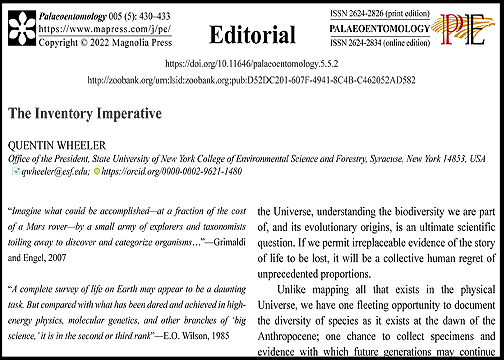Abstract
“Imagine what could be accomplished—at a fraction of the cost of a Mars rover—by a small army of explorers and taxonomists toiling away to discover and categorize organisms…”—Grimaldi and Engel, 2007
“A complete survey of life on Earth may appear to be a daunting task. But compared with what has been dared and achieved in high-energy physics, molecular genetics, and other branches of ‘big science,’ it is in the second or third rank”—E.O. Wilson, 1985
References
- Barnosky, A.D., Matzke, N., Tomiya, S., Wogan, G.O.U., Swartz, B., Quental, T.B., Marshall, C., McGuire, J.L., Lindsey, E.L., Maquire, K.C., Mersey, B. & Ferrer, E.A. (2011) Has the Earth’s sixth mass extinction already arrived? Nature, 471 (7336), 51–57. https://doi.org/10.1038/nature09678
- Benyus, J.M. (1997) Biomimicry: innovation inspired by nature. Morrow, New York, 308 pp.
- Darwin, C. (1859) On the origin of species by means of natural selection, or the preservation of favoured races in the struggle for life. John Murray, London, ix+502+[32] pp. https://doi.org/10.5962/bhl.title.82303
- Grimaldi, D. & Engel, M.S. (2005) Evolution of the insects. Cambridge University Press, Cambridge, xv+755 pp.
- Grimaldi, D. & Engel, M.S. (2007) Why descriptive science still matters. BioScience,57, 646–647. https://doi.org/10.1641/B570802
- Hennig, W. (1966) Phylogenetic systematics. University of Illinois Press, Urbana and Chicago, xiii+263 pp.
- Kolbert, E. (2014) The sixth extinction: an unnatural history. Henry Holt and Company, New York, xiii+319 pp.
- Platnick, N.I. (1979) Philosophy and the transformation of cladistics. Systematic Zoology, 28 (4), 537–546. https://doi.org/10.2307/sysbio/28.4.537
- Wheeler, Q.D. (2004) Taxonomic triage and the poverty of phylogeny. Philosophical Transactions of the Royal Society of London B, 359 (1444), 571–583. https://doi.org/10.1098/rstb.2003.1452
- Wheeler, Q.D. (2006) Two and six (review of Grimaldi and Engel, Evolution of the Insects). London, Times Literary Supplement, 2 June, p. 13.
- Wheeler, Q.D. (2020) A taxonomic renaissance in three acts. Megataxa, 1, 4–8. https://doi.org/10.11646/megataxa.1.1.2
- Wheeler, Q.D., Knapp, S., Stevenson, D.W., Stevenson, J., Blum, S.D., Boom, B.M., Borisy, G.G., Buizer, J.L., De Carvalho, M.R., Cibrian, A., Donoghue, M.J., Doyle, V., Gerson, E.M., Graham, C.H., Graves, P., Graves, S.J., Guralnick, R.P., Hamilton, A.L., Hanken, J., Law, W., Lipscomb, D.L., Lovejoy, T.E., Miller, H., Miller, J.S., Naeem, S., Novacek, M.J., Page, L.M., Platnick, N.I., Porter-Morgan, H., Raven, P.H., Solis, M.A., Valdecasas, A.G., Van Der Leeuw, S., Vasco, A., Vermeulen, N., Vogel, J., Walls, R. L., Wilson, E.O. & Woolley J.B. (2012) Mapping the biosphere: exploring species to understand the origin, organization and sustainability of biodiversity. Systematics and Biodiversity, 10 (1), 1–20. https://doi.org/10.1080/14772000.2012.665095
- Williams, D.M., Schmitt, M. & Wheeler, Q. (Eds) (2016) The future of phylogenetic systematics: The legacy of Willi Hennig. Cambridge University Press, Cambridge, xvi+478 pp. https://doi.org/10.1017/CBO9781316338797
- Wilson, E.O. (1985) The biological diversity crisis: A challenge to science. Issues in Science and Technology, 2: 20–29.
- Wilson, E.O. (1992) The diversity of life. Harvard University Press, Cambridge, Mass., 424 pp.
- Wilson, E.O. (2016) Half-Earth: our planet’s fight for life. Liveright, New York, 259 pp.


